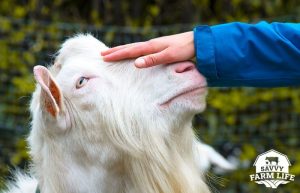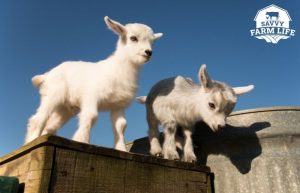
How to Decide Whether or Not You Should Get Goats
Goats have been popular farm animals both for milk and meat but also as cute family pets. And now, they’re even moving into the house like the family dog! But are goats really the animals for you? Before you get goats, you’ll want to make sure you have adequate time, resources, and patience to take care of them.
Should you get a goat? You should get a goat if you are looking for a smaller type of farm animal to profit from and you don’t mind having at least a few of them. You should not get a goat if you want a single pet or are bothered by strong odors.
While the idea of getting a single goat and keeping it in your house as a pet may sound good, in reality, it could be a disaster. However, if you are looking for small livestock to keep in a pen or pasture, goats are a great choice. Read on to learn more of the pros and cons of owning goats.
Pros of Owning Goats
If so many farmers and hobbyists keep goats so successfully, there must be a lot of good reasons for it. After all, raising goats is not only a source of income but can be enjoyable and satisfying work. And goats can be entertaining to observe.
Pros of Owning Goats #1: Profitability
Goats can make you money. Between goat meat, goat milk, goat cheese, and even goat hair of certain breeds, they produce a number of valuable resources that can be sold for a profit. They also give birth to multiple offspring at a time and have a gestation period of only 150 days, making them a great option for a livestock breeding operation.
Goat Meat
Goat meat is actually not only healthier than beef, but even healthier than chicken. It contains significantly less fat, calories, and cholesterol than either of those other options. However, it does have a more noticeable flavor and scent while cooking, which could be one reason why the others are more highly preferred. It can also get dried out more easily due to the reduced fat content if cooked over too much heat. But for those who’ve learned how to finesse this exotic meat, it is in high demand.
Most commonly found in restaurants that serve African and Caribbean cuisine, goat meat is also heavily in demand by those communities who frequently cook those types of foods at home. Since goat is rarely available in regular grocery stores, these chefs turn to local butchers for their goat meat.
Goat Milk
Whether you particularly care for goat milk or not, more than 65% of the world’s population drinks it regularly. Oftentimes, this is because it is the most readily available type of milk in the vicinity. But there are also many health advantages to drinking goat milk.
For individuals who have developed a sensitivity to lactose, one advantage of goat milk is that it contains 12% less lactose than cow milk. Goat milk also contains a higher concentration of “prebiotic carbohydrates,” an indirectly beneficial type of carb, which help nourish the beneficial bacteria in the gut. For individuals aiming to increase their calcium or protein intake, goat milk also beats out cow milk in richness of these nutrients.
Goat milk can also be preferable to plant-based milks as the nutritional value of each depends drastically on the additives included by the brand. Plant-based milks are marketed as a healthier option, and while they may be in some ways, they are still processed foods.
The higher fat content of goat milk could be a drawback for some, but for those on the keto diet or who need to consume more fat for health-related reasons, this could be a benefit.
Goat Cheese
An excellent source of vitamins and minerals, goat cheese is also rich in healthy fats and proteins. And the kind of fats in goat cheese can help you feel more full and satisfied without eating as much.
And because it’s made from goat milk, it is also friendlier to the lactose-sensitive with its lower lactose concentration.
If you want to get fancy with it, goat milk can be made into a vast variety of cheeses which can be sold at a higher cost than many other types of cheese. If that is something you would enjoy doing, it could be a good source of income for you.
Goat Hair
Mohair, the hair produced by the angora goat, is one of the warmest fibers in the world. Cashmere is also produced from fiber goats. These special types of goat hair can be spun into yarn, used for needle felting, or woven. The fabrics made from this material are luxurious, soft, and very warm. And they are highly sought after and very expensive. You can make a profit from raising these goats and selling their hair.
Pros of Owning Goats #2: Easy Maintenance
Goats’ smaller size make them easier to handle physically than an unruly horse or cow. And more of them can fit in one pasture comfortably than the same number of larger farm animals. Additionally, unless they are one of the rare fiber breeds, they don’t require shearing like sheep, llamas, or alpacas do, making them a somewhat lower-maintenance choice.
Diet
Because goats are browsers, which means they prefer eating shrubs and low-hanging branches to grazing on grass, the majority of their diet is taken care of by the land every year. Goats are one of the few small livestock breeds that can flourish in wooded settings compared to pasture settings. Goats love to pick at twigs and leaves, making them great for disposing of garden clippings!
For this reason, it can be really easy to feed your goats. If you are keeping them in a small pen where they don’t have access to much browse, you will need to supplement their diet with hay. You can also supplement their diet with small amounts of grain to provide extra nutrients.
Recycled Junk for Toys
Goats can be kept entertained very inexpensively. A simple structure of plywood ramps can be built to provide them with climbing areas for exercising, exploring, and visual barriers from more aggressive individuals.
Foraging toys that drop food when played with and toys that can be kicked around and explored can be made from inexpensive or recyclable items such as cardboard boxes, scrap wood, PVC pipe, etc. Goats also enjoy playing with large rubber balls, old tires, and puzzle food bowls marketed for dogs with treats inside.
Most of these options are inexpensive to purchase or make and are another point towards goats being less trouble than some other animal options.
To get some more ideas of what you can put in your goat pen, check out my article What Goats Need In Their Pen: Complete List.
Cons of Owning Goats
 Like most farm animals, goats are also the herd type who require at least one other animal to have as a companion. They are designed to stick with a group for their whole lives and will become depressed and potentially develop negative behaviors if they are left alone. Even a goat kept in the house as a dog-like companion to the family needs to have another goat friend for when family members are all away or as kids grow up and are absent from the house more frequently.
Like most farm animals, goats are also the herd type who require at least one other animal to have as a companion. They are designed to stick with a group for their whole lives and will become depressed and potentially develop negative behaviors if they are left alone. Even a goat kept in the house as a dog-like companion to the family needs to have another goat friend for when family members are all away or as kids grow up and are absent from the house more frequently.
The necessity of a companion at the very least and a whole herd at best can increase the cost of owning goats exponentially.
Cons of Owning Goats #1: Destructiveness
Goats enjoy destroying things. They don’t mean to be bad, they just get bored and destroying things is entertaining and helps pass the time enjoyably.
But this can be a really annoying habit for the humans in their lives. Providing your goats with things that are okay for them to destroy—such as old tires and other things that would otherwise be thrown away—can help keep them mentally stimulated and prevent boredom while also getting more use out of things you no longer need for their original purposes.
But even then, troublemakers may chew on fence posts, get their heads stuck in between fence wires, and find seemingly impossible ways to escape their enclosures and cause more havoc wherever they can.
Goats will often eat non-edible items out of boredom or hunger. To get a rundown of what goats can and can’t eat, visit my article Complete List of What Goats Can (And Can’t) Eat.
Cons of Owning Goats #2: Cost of Feeding in Winter
If you live in a part of the world where grass and shrubs don’t grow in the winter, you will need to further supplement your goats’ diets with hay and grain. While most of their nutrients grow for free in the warmer months, you’ll have additional costs to make up for the loss of greenery in the cooler parts of the year. The larger your herd, the larger the additional cost will be.
Cons of Owning Goats #3: Vet Costs
Just like any other animals, sometimes goats get sick or injured and need to visit the vet. Sometimes the bill can be quite high. Whether you have a pet goat that your family is emotionally attached to who requires an expensive surgery to save its life, or whether your whole herd contracts a disease and all need to be treated, vet costs are not insignificant.
Cons of Owning Goats #4: Smells
Adult male goats, called billy goats, tend to have a very strong odor about them. During mating season, they make it worse by urinating on themselves to attract mates and ward off other competing males. Even neutered males in the off-season can smell highly unpleasant. This is why usually only females are selected for pets in the house.
But even if all your goats are outdoors only, you may catch an unpleasant whiff from time to time.
Cons of Owning Goats #5: Escape Artists
I know one frustration that I have personally faced when it comes to goats is that they will find any way to escape their pen! While most livestock animals leave fencing alone, goats on the other hand, will often test fencing to see if there is a way out. I’ve spent countless hours securing goat pens and catching escaped goats.
Now that you know the pros and cons of goat ownership, you are equipped with the necessary information to decide whether they are a good choice for you. If you’re still on the fence about it, we have a wealth of resources on keeping and caring for goats here at Savvy Farm Life that you are welcome to check out as you make your decision. I wish you the best of luck in goat ownership if you choose to pursue it!
To own goats, you must be willing to commit time to their care. Goats can live over a decade, so you want to make sure you are willing to put in the time to ensure they are properly cared for. To learn more, visit my article How Long Do Goats Live? Goat Lifespan By Breed & Habitat.
